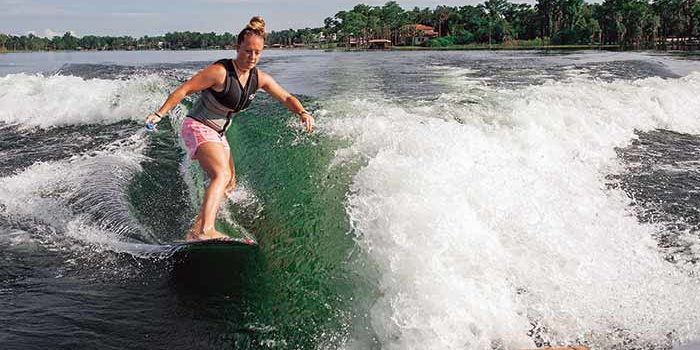Also, wake surfing restricted within 200 feet of dock, person or anchored vessel.
South Carolina House Bill H3308 was signed into effect March 14 by Gov. McMaster, establishing a new 100-foot idle speed distance limit that boats underway must observe when approaching a dock, a person in the water or an anchored vessel on most of South Carolina’s major reservoirs and coastal waterways. The bill was previously passed last year by the S.C. Senate. Colonel A. Chisolm Frampton, SCDNR deputy director for law enforcement, said: “This is a much-needed change that will increase boating safety for all South Carolina boaters.”
The new law doubles the previous distance of 50 feet on Lake Hartwell and major reservoirs, plus a section of the lower Savannah River. The 100-foot distance limit does not apply to Lake Moultrie.
The new law also prohibits “wake surfing” on all S.C. waters within 200 feet of a dock, a person in the water or an anchored watercraft. Wake surfing is defined in the new law as “a vessel that is ballasted in the stern so as to create a wake that is, or is intended to be, surfed by another person.”
Implications And Enforcement

A new law increases the distance limit for operating in excess of idle speed to 100 feet on most state waters and prohibits wake surfing within 200 feet on all S.C. waters.
Notice that the law states “idle speed” although these areas are marked as “no wake.” Idle speed is that speed below which steering is impossible. Idle speed is different for different boats. Some boats at idle speed will definitely throw a wake.
To operate in compliance with the new law, skippers will have to cut the throttle at double the distance from existing No Wake buoys until the buoys are repositioned. It is unknown if the US COE and controlling authorities will need to relocate thousands of buoys to the 100 ft limit. It is unclear whether the law will apply to bridges or launching ramps without docks.
The law will effectively prohibit wake surfing in many smaller coves with docks. Bass fishermen, especially during club events, will find high speed travel in coves or near anchored vessels to be impossible if they want to operate within the law. Although South Carolina and Georgia have reciprocity agreements on fishing and boating safety laws, it is uncertain what the impact of the new law will be on the Georgia side of Lake Hartwell.
There are widespread complaints about lack of enforcement of the previous limits, and law enforcement officers are stretched thinner than ever. The longer the distance of the zone, the more difficult it is to gauge the distance from an anchored boat or dock. It would seem gaining a conviction would be very difficult for prosecutors of those arrested for infractions of this law. For these reasons, many have concerns about the wisdom of passing what could be unenforceable laws.







